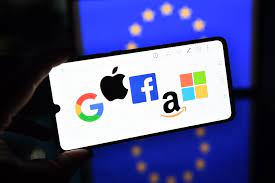
The new Digital Markets Act, a stringent set of regulations that might disrupt the business models of significant digital platforms, was unveiled by the European Commission on Wednesday, designating six IT titans as "gatekeepers" under its provisions.
According to the Commission, Amazon, Alphabet, Apple, Microsoft, Meta, and ByteDance will have six months to bring their primary platform services in line with the DMA's requirements.
The Commission declared that it considers China's ByteDance, Apple, Alphabet, Meta, Microsoft, and Amazon to be "gatekeepers." The phrase refers to sizable internet platforms that the EU believes are limiting access to essential platform features including messaging, communications, online search, and advertising.
The bloc has launched five fresh market probes into the American digital behemoths Apple and Microsoft to determine whether or not some of their services can be considered gatekeepers.
The EU will review Microsoft and Apple submissions as part of these investigations. The EU considers Apple's iMessage service, Microsoft's Bing, Edge, and Microsoft Advertising platforms, as well as Microsoft's Bing, to fit the criteria for being designated gatekeepers. Microsoft and Apple disagree.
Even though the European Commission claims that Apple's iPadOS does not meet the requirements for gatekeeping, the EU will look into the matter. iPadOS is the operating system that powers Apple's range of iPad tablets.
A ground-breaking new EU law called the Digital Markets Act seeks to rein in giant digital companies' anticompetitive behaviour. Smaller online enterprises and other corporations have complained that the commercial practises of these companies have harmed them.
For instance, the key mobile OS platforms worldwide, Google and Apple, levy a 30% fee for in-app purchases, which companies like Spotify and Epic Games have criticised as being excessive.
Apple stated that it is still "very concerned" about the threats the Digital Markets Act presents to its consumers' privacy and data security.
The DMA, according to the company, might damage the security of its iMessage platform; the EU wants Apple to make it simpler for iMessage to cooperate with competing messaging services like WhatsApp.
“Our focus will be on how we mitigate these impacts and continue to deliver the very best products and services to our European customers,” an Apple spokesperson said in an emailed statement to CNBC on Wednesday.
Of note, the EU also identified ByteDance, a Chinese company, as a gatekeeper. Global regulators are paying more attention to its social media platform TikTok because they are concerned about its rising popularity and the possibility that it could transmit misinformation to a youthful audience.
The potential for Chinese control over TikTok has also sparked concern from EU legislators, particularly the chance that Beijing would use the software to spy on users.
(Source:www.cnbc.com)
According to the Commission, Amazon, Alphabet, Apple, Microsoft, Meta, and ByteDance will have six months to bring their primary platform services in line with the DMA's requirements.
The Commission declared that it considers China's ByteDance, Apple, Alphabet, Meta, Microsoft, and Amazon to be "gatekeepers." The phrase refers to sizable internet platforms that the EU believes are limiting access to essential platform features including messaging, communications, online search, and advertising.
The bloc has launched five fresh market probes into the American digital behemoths Apple and Microsoft to determine whether or not some of their services can be considered gatekeepers.
The EU will review Microsoft and Apple submissions as part of these investigations. The EU considers Apple's iMessage service, Microsoft's Bing, Edge, and Microsoft Advertising platforms, as well as Microsoft's Bing, to fit the criteria for being designated gatekeepers. Microsoft and Apple disagree.
Even though the European Commission claims that Apple's iPadOS does not meet the requirements for gatekeeping, the EU will look into the matter. iPadOS is the operating system that powers Apple's range of iPad tablets.
A ground-breaking new EU law called the Digital Markets Act seeks to rein in giant digital companies' anticompetitive behaviour. Smaller online enterprises and other corporations have complained that the commercial practises of these companies have harmed them.
For instance, the key mobile OS platforms worldwide, Google and Apple, levy a 30% fee for in-app purchases, which companies like Spotify and Epic Games have criticised as being excessive.
Apple stated that it is still "very concerned" about the threats the Digital Markets Act presents to its consumers' privacy and data security.
The DMA, according to the company, might damage the security of its iMessage platform; the EU wants Apple to make it simpler for iMessage to cooperate with competing messaging services like WhatsApp.
“Our focus will be on how we mitigate these impacts and continue to deliver the very best products and services to our European customers,” an Apple spokesperson said in an emailed statement to CNBC on Wednesday.
Of note, the EU also identified ByteDance, a Chinese company, as a gatekeeper. Global regulators are paying more attention to its social media platform TikTok because they are concerned about its rising popularity and the possibility that it could transmit misinformation to a youthful audience.
The potential for Chinese control over TikTok has also sparked concern from EU legislators, particularly the chance that Beijing would use the software to spy on users.
(Source:www.cnbc.com)














